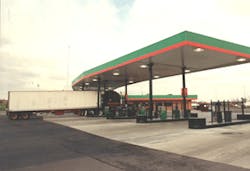Ongoing volatility in the diesel market has led trucking companies to make strict pricing discipline a regular part of their operations.
In second-quarter earnings reports, most trucking companies said they are still able to minimize the impact of higher fuel costs on the bottom line, thanks to the rigorous application of fuel surcharges and operational adjustments. Yet fuel costs remain a major concern as they continue to eat up more and more operating capital.
“The skyrocketing cost of fuel is an obvious concern,” said Stoney “Mit” Stubbs, Jr., president & CEO of Dallas-based refrigerated carrier Frozen Food Express (FEE). “We continue to work with our customers to address the rising cost of crude oil as the price per barrel reaches [and exceeds] $70, with no apparent end in sight. But our fuel surcharges have helped us mitigate that problem.”
Stubbs noted that of the $252.9 million in revenue generated during the first half of 2006, $37.2 million, or 14.7%, came from fuel surcharges. Fuel surcharges were up $12.4 million compared to the same period last year.
Some fleets, such as Covenant Transportation in Chattanooga, TN, actually came out ahead, thanks to a combination of better surcharge collection practices and reduced fuel consumption.
“Our fuel costs, net of surcharge on company truck miles, actually improved versus last year, despite a substantial increase in fuel prices,” said David Parker, Covenant’s chairman, president & CEO. “Improved collection of surcharges, better fuel economy due to lower idle time, and [fewer] nonrevenue miles contributed to the improvement.”
However, Randy Marten, chairman & president of Mondovi, WI-based refrigerated carrier Marten Transport, pointed out the continued rapid growth of fuel as an operating expense will constrict profit margins.
“The major change in our expenses for the second quarter this year related to fuel costs,” he said. “Our average cost of fuel in the second quarter was $2.75 per gallon, compared with $2.15 per gallon in the same period last year. That means fuel expenses, net of fuel surcharges and expressed as a percentage of freight revenue, increased 193 basis points over the second quarter of 2005 – not only due to the increased cost of fuel, but also because miles driven by company drivers increased as compared with independent contractors.”
G. Larry Owens, president & CEO of Smithway Motor Xpress Corp, Fort Dodge, IA, shares Marten’s worries.
“For the second quarter, average fuel prices increased 28% to $2.75 per gallon, compared to $2.15 per gallon in the second quarter last year,” he said. “Even though fuel surcharge revenue mitigated 77% of this price increase, fuel prices reduced our second quarter net earnings by approximately seven cents per share, and negatively impacted our operating ratio by approximately 116 basis points.”
About the Author
Sean Kilcarr
Editor in Chief
Sean Kilcarr is a former longtime FleetOwner senior editor who wrote for the publication from 2000 to 2018. He served as editor-in-chief from 2017 to 2018.
